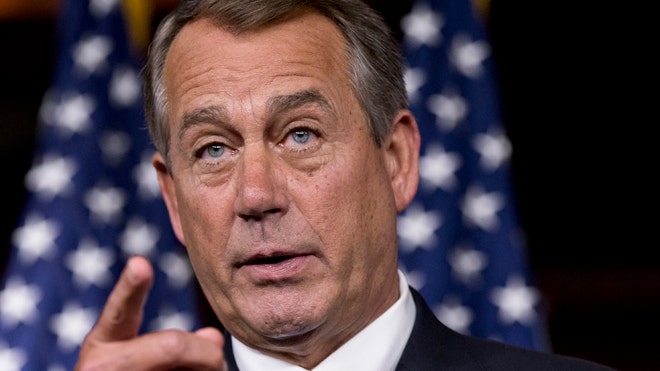GOP to White House: ObamaCare delay for businesses unfair to everyone else
Published July 09, 2013 - FoxNews.com

House Republican leaders on Tuesday urged the Obama administration to grant everybody a reprieve from the ObamaCare insurance mandate, suggesting the recent decision to delay only the requirement on businesses would be unfair to everyone else.
"We agree with you that the burden was overwhelming for employers, but we also believe American families need the same relief," House Speaker John Boehner and several other top Republicans wrote in a letter to President Obama.
They addressed what is becoming a mounting concern over the administration's decision to delay, until 2015, a requirement that large employers provide health insurance to workers.
The administration, in announcing the change, kept in place the requirement on individuals -- known as the individual mandate -- to obtain insurance. Critics argue that the selective delay will force even more people -- who would have otherwise gotten insurance through their jobs -- to go in search of insurance on the individual market or face a fine.
The delay potentially means more people will be buying insurance out of their own pocket, buying insurance with the help of additional taxpayer subsidies or just opting out and being charged with a hefty fine by the government.
Republicans asked Obama for a detailed breakdown on how the delay of the employer mandate would affect all these aspects -- how it would increase the cost of subsidies, and how it would increase the number of individuals expected to pay a fine.
"We recognize that the decision to delay the employer mandate was likely not a decision you made in only a day and necessarily required substantial review by analysts" at various departments, they wrote. "Your decision to delay one part of the law affecting employers and leave in place provisions regulating individual and family health care creates many new questions and concerns."
The lawmakers also called a press conference to urge Obama to address the issue.
"The president's actions on ObamaCare last week were stunning," House Republican Leader Eric Cantor said. "I never thought I'd see the day when the White House, the president, came down on the side of big business but left the American people out in the cold as far as this health care mandate is concerned."
...
GOP to White House: ObamaCare delay for businesses unfair to everyone else | Fox News
==============================
Concern for the Little Guy, or Obstructionism?
Published July 09, 2013 - FoxNews.com
House Republican leaders on Tuesday urged the Obama administration to grant everybody a reprieve from the ObamaCare insurance mandate, suggesting the recent decision to delay only the requirement on businesses would be unfair to everyone else.
"We agree with you that the burden was overwhelming for employers, but we also believe American families need the same relief," House Speaker John Boehner and several other top Republicans wrote in a letter to President Obama.
They addressed what is becoming a mounting concern over the administration's decision to delay, until 2015, a requirement that large employers provide health insurance to workers.
The administration, in announcing the change, kept in place the requirement on individuals -- known as the individual mandate -- to obtain insurance. Critics argue that the selective delay will force even more people -- who would have otherwise gotten insurance through their jobs -- to go in search of insurance on the individual market or face a fine.
The delay potentially means more people will be buying insurance out of their own pocket, buying insurance with the help of additional taxpayer subsidies or just opting out and being charged with a hefty fine by the government.
Republicans asked Obama for a detailed breakdown on how the delay of the employer mandate would affect all these aspects -- how it would increase the cost of subsidies, and how it would increase the number of individuals expected to pay a fine.
"We recognize that the decision to delay the employer mandate was likely not a decision you made in only a day and necessarily required substantial review by analysts" at various departments, they wrote. "Your decision to delay one part of the law affecting employers and leave in place provisions regulating individual and family health care creates many new questions and concerns."
The lawmakers also called a press conference to urge Obama to address the issue.
"The president's actions on ObamaCare last week were stunning," House Republican Leader Eric Cantor said. "I never thought I'd see the day when the White House, the president, came down on the side of big business but left the American people out in the cold as far as this health care mandate is concerned."
...
GOP to White House: ObamaCare delay for businesses unfair to everyone else | Fox News
==============================
Concern for the Little Guy, or Obstructionism?


